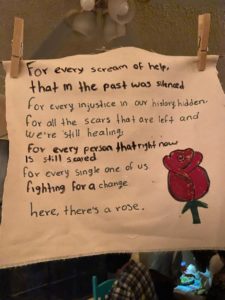
Last week I traveled to the U.S.-Mexico border for the first time. One of the initial conversations I had when I arrived at my hotel in El Paso, TX was with Frank, a young man from Ciudad Juarez who works in El Paso and commutes everyday back-and-forth to serve customers in a local restaurant. As Frank was checking on our food order and serving us, he was curious to know why my colleagues and I were there. He asked us about the type of work we do and the purpose of our visit to the El Paso-Juarez region. Once we expressed that we were there to learn– raise awareness about realities at the border, and advocate for immigration reform — Frank smiled gladly and told us not to forget that although there is a massive wall between El Paso and Ciudad Juarez, the people there are one community and, in many cases, one family. It is in fact his community and his family that are divided by the border wall.
Frank repeatedly said that he is lucky to be able to travel between the two cities, while many suffer tremendously and even die just trying to cross. I experienced that myself. My American passport (which I obtained only six years ago, after nearly a decade of fearing for my life having fled Syria) allowed me to cross easily and with dignity, unlike thousands of migrants stranded at the U.S.-Mexico border or millions of Syrians struggling to find refuge.
People in the El Paso-Juarez region have witnessed their lives change dramatically as a result of everchanging policies, regulations, and legislations enacted in Washington, D.C., where I currently live. I was curious to learn more from Frank and others I met during my visit. And I spent most of the time listening and observing in an attempt to comprehend this ongoing human tragedy.
As an immigrant myself, who is familiar with border dynamics, war, immigration, and human suffering, I was not surprised by what I saw and heard in El Paso and Ciudad Juarez. What surprised me was the countless parallels between this border region and others that I’ve encountered previously all the way across the globe. Flashbacks from a Turkey-Syria border visit I made a few years ago haunted me throughout this trip to the U.S.-Mexico border. All I could think about is how similar the human tragedies are; families separated, parents detained or missing or killed, children abandoned, and everyone in search of their basic human rights and a dignified life.
During the trip, I was fortunate to engage with Customs and Border Protection officers, migrant shelter staff, United Nations personnel, and local community leaders who shared similar ideals and missions in wanting to help change current ineffective immigration and asylum regulations, and broken border policies. My colleagues and I listened to their struggles acknowledging the countless systematic limitations they wrestle with every single day. Yet, they all assured us that they are doing their best and asked us to convey and amplify those concerns in Washington, D.C. and beyond.
It should never be “us” and “them.” It should always be the collective “we.” We are all connected beyond border walls and barbed wire fences. And if we truly comprehend this reality, we could genuinely help each other and alleviate this shared human suffering. Because when migrants and immigrants thrive, we all thrive. At the end of the day, we are all immigrants. So, I urge you to help those on the margins by demanding meaningful and comprehensive immigration reform. Congress and the White House must act to give migrants and their families the dignity they deserve by passing legislation that affirms that. That is our responsibility as humans. That is the bare minimum.

